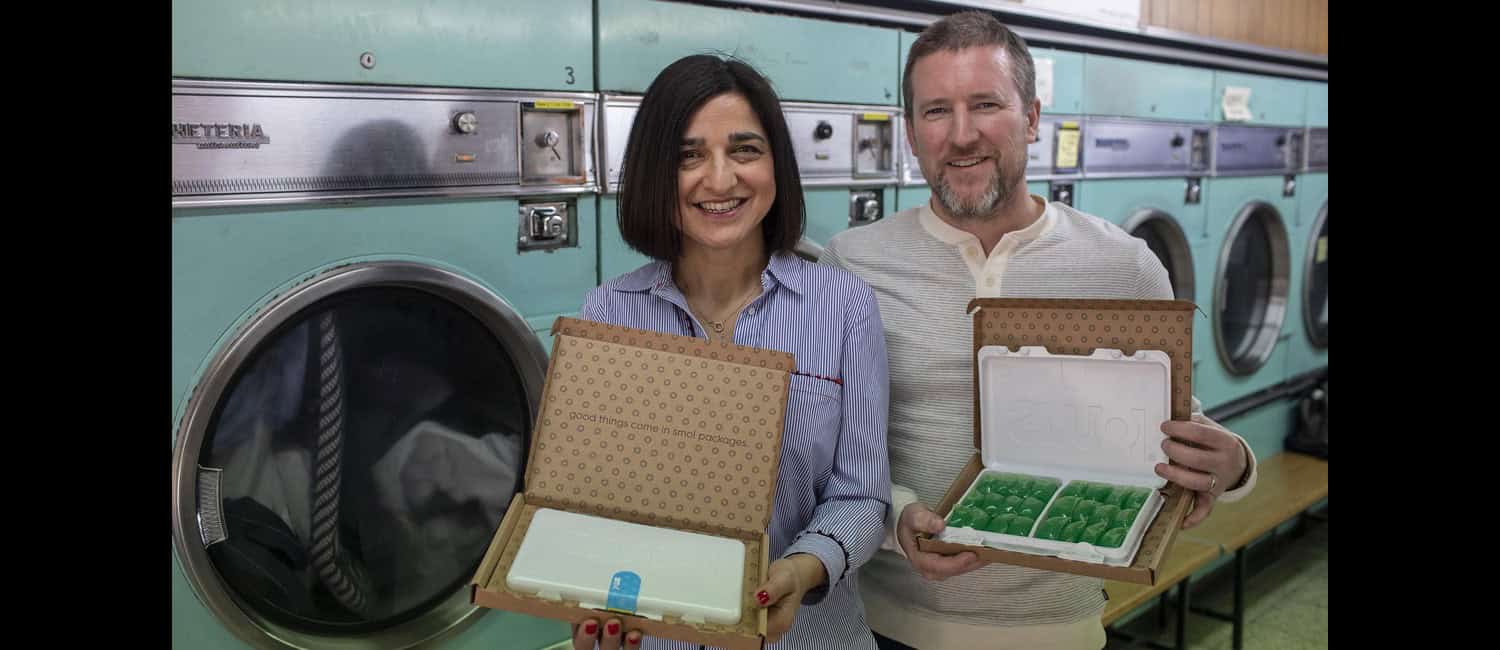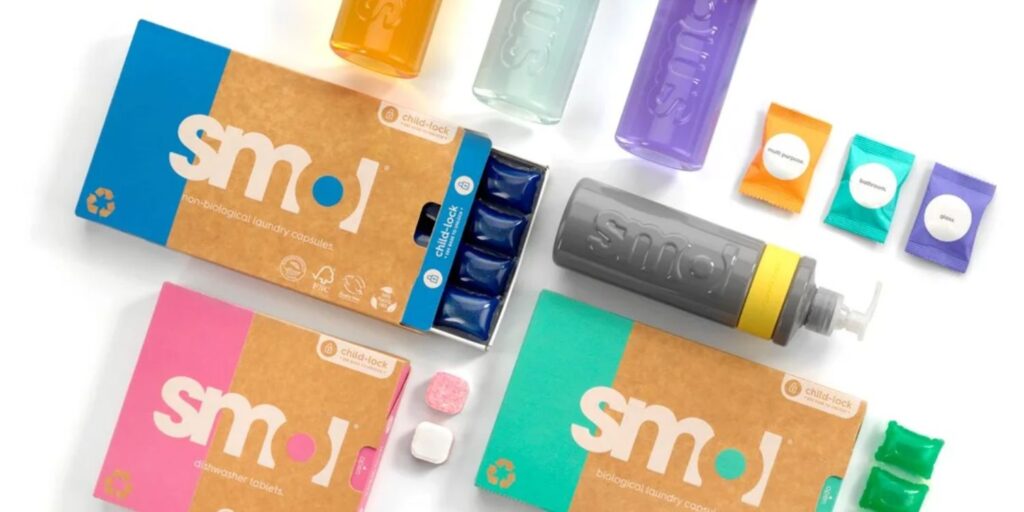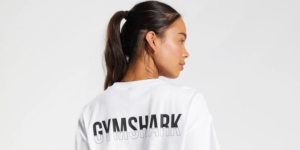In a world drowning in plastic and greenwashed claims, smol literally set out to clean up the cleaning industry. With minimalist, eco-friendly packaging and formulas that pack a punch, this UK-based startup quietly delivers a revolution to doorsteps everywhere.
smol’s remarkable story is one of passion and innovation. The brand disrupted the laundry market in 2018, proving that you can create sustainable cleaning products without compromising on quality or performance while keeping consumer costs down. This, coupled with the convenience of home delivery, left competitors with no choice but to step up to the mark.
But smol founders Paula Quazi and Nick Green didn’t achieve success overnight. In this article, we look back and learn more about smol’s journey and the challenges its owners overcame to get where they are today.
Challenges faced by smol in the early days
Financial limitations and bootstrapping
When co-founders Paula Quazi and Nick Green launched Smol in 2018 after two years of development, they initially self-funded the business. They chose not to raise external capital, meaning every business decision had to be made carefully.
Disrupting an established industry
Large multinationals like Procter & Gamble, Unilever, and Reckitt Benckiser dominated the household cleaning space. Consumers are highly brand-loyal and sceptical of alternatives, and smol had to work hard to overcome consumer scepticism, resistance to changing existing habits, and trust hurdles
They tackled this with a free trial model, where customers could test the product before committing to a subscription. This was a new and innovative approach with much risk at the time.
Manufacturing hurdles
smol set themselves the goal of creating eco-friendly, cruelty-free products that worked just as well as mainstream brands, without the harmful chemicals or excess plastic. That meant:
- Developing cutting-edge formulations from scratch
- Finding suppliers who could commit to sustainable practices in low volumes
- Contending with regulatory requirements in a highly controlled industry
Getting the original formulation for the laundry capsule right took months of testing.

Building a subscription model
In 2018, subscription models for everyday products weren’t as standard in the UK as they are now. Convincing people to subscribe to laundry capsules online felt like defying conventional wisdom.
smol had to educate customers on the environmental and convenience benefits and build software that makes the subscription management flexible and user-friendly.
A startup with a mission
Quazi and Green were frustrated with the harmful and unimaginative nature of cleaning products. Their inspiration was simple: they wanted to invent a better and kinder detergent alternative—kinder to the planet, our skin, and our pockets.
Shockingly, product innovation and development in the laundry industry stagnated for around a century before Smol came along. The big brands smothered their products in single-use plastic, and there was very little change in the production or marketing of cleaning goods.
On top of that, none of the existing companies offered home delivery or affordable pricing. In an interview with Business Advice, Quazi candidly explains:
“Buying detergent is one of those regrettable purchases on the household aisle. The brands are ancient, and the only way to avoid getting ripped off is to buy multi-buy promotions. But who wants their kitchen cupboards full of cleaning stuff?”
- Humble beginnings: The story behind Not on The High Street
- Humble beginnings: The Gymshark story, from garage to global
- 10 great UK businesses with humble beginnings
However, while the likes of Persil and Fairy dominated the market for some time, they didn’t have the sustainable solutions their customers were hungry for. So, while everyone else slept on the sector’s overdue innovation potential, Quazi and Green discovered a golden opportunity to do laundry differently.
What does ‘smol’ mean?
You might wonder what ‘smol’ means and how the founders chose this brand name. Well, it was a bit of an accident.
‘Smol’ is an intentional misspelling of ‘small’. It’s a slang term from the mid-2010s used to describe something tiny and cute, particularly animals. If you’re unfamiliar with smol products, these are their cute and squishy laundry capsules:

Not only is the brand name visually fitting, but it also perfectly represents the unique, compact packaging.
Balancing safe ingredients with high-performance
Quazi and Green were trying to invent high-quality, sustainable cleaning products. But like other entrepreneurs, they faced various challenges, one of the main ones concerning chemical content.
They needed to find a way to replace the harsh chemicals typically found in cleaning products with safer but equally powerful alternatives. Naturally, this wasn’t quick or simple. It involved extensive trial and error and testing various chemical formulas before results eventually showed that smol performs just as well as (and sometimes better than) existing capsules.
Another challenge was the packaging. The smol founders had to find a plastic-free solution that complied with UK AISE regulations requiring child locks on all capsule products. It took many failed prototypes for Quazi and Green to introduce the world’s first cardboard, child-safe laundry capsule box.

smol boxes look nothing like what you’d typically find in supermarkets. They’re smaller, slicker, and come in an entirely different shape while holding the same number of detergent pods as a regular-sized big-brand tub.
Product development was a considerable challenge for Quazi and Green. In the beginning, they also struggled with the pressures of running a new business. In the Business Advice interview, Quazi explains: “When we launched, Nick and I literally did everything ourselves. It was relentless. We were production, customer service, marketing, PR, finance, and IT all rolled into one!”
She also admits that “there were moments when it seemed so impossible that we nearly gave up.” But they got there with hard work, passion, and perseverance, and it was “an amazing feeling to have created a breakthrough in the market.”
Scaling the business
smol expanded its product range from just laundry capsules to include:
- Dishwasher tablets
- Fabric conditioner
- Refillable surface sprays
- Sustainable dishwasher rinse aid & other accessories
The direct-to-consumer (DTC) model allowed smol to gather real-time customer feedback and iterate quickly. Unlike traditional businesses dependent on retailers, smol maintained control over branding, data, and customer relationships.
In 2020, smol raised a £8 million Series A funding round led by JamJar Investments (founded by the Innocent Drinks team), which fueled its rapid growth. The funding helped in:
- Expanding product lines and R&D
- Enhancing packaging innovation
- Growing their marketing and manufacturing capabilities
In recent years, smol has become one of the fastest-growing sustainable homecare brands in the UK, with over 1 million washes a week. The brand continues to advocate for less plastic use, supporting initiatives like refillable packs, return-and-reuse programs, and more sustainable consumption habits.
What sets smol apart?
We’ve learnt that Smol does things differently. Not only has it completely revolutionised detergent production, but it has also adopted a DTC business model, something that no other laundry brand has done before.
They’ve removed the need for customers to ever have to think about shopping for cleaning agents again. Instead, when signing up for a smol account, they simply ask how many loads of laundry you do per week or how often you use the dishwasher, and they send you the corresponding amount of cleaning tablets.
Another unique element is the brand name. It makes them stand out from the crowd and sparks intrigue. It’s also fun and satisfying to say out loud!
In addition, smol’s tone of voice and brand identity are unlike its competitors. It uses simple, easy-to-understand language that customers can easily connect with. It avoids industry jargon, and the team shares realistic, actionable household cleaning hacks and tips on how to clean in a planet-friendly way.
Also, Smol stays true to its values. The company doesn’t simply claim it cares about the environment; it shares regular impact reports and educates its audience on how to be more sustainable.
And that’s not all – each customer sees an individual impact summary of the difference they’ve made to our planet by using smol products, making their relationship with smol far more meaningful than a mere monetary transaction.
smol lessons for startups
Smol’s story proves it’s worth pushing through the challenges if you truly believe in something. Starting a business isn’t easy, and there’s no fast track to success. Setbacks are a given, but if you think your idea can make a real difference, passion and a sense of purpose will make that dream a reality.
Entrepreneurship can also be quite isolating. If you lack support or feel no one understands your vision, think about other business owners who inspire you. For Quazi, it’s “Tony Hsieh of Zappos because he has led the charge in customer service. His ideas were a breakthrough at the time and have built his business advantage.”
“Yvon Chouinard of Patagonia is also a hero of mine. His sense of purpose has guided Patagonia to incredible success through strategies that others may see as commercial suicide. He had the courage to ask his customers not to buy his products but to converse or fix their existing products. Not only has this created awareness around the negativity of throwaway clothing, but it also built significant brand love for Patagonia.”
Finally, the smol founders have some advice for aspiring entrepreneurs: “Trust your instinct, work hard, and never give up.”
Feeling inspired to make a difference?
Are you feeling inspired to start your own business? We hope so. There is no time like the present, and we’re here at 1st Formations to guide you every step of the way.
Find out how to register a company in four simple steps, or share any comments or questions you might have below. Don’t forget to browse the 1st Formations blog for more inspiring success stories like this.
Please note that the information provided in this article is for general informational purposes only and does not constitute legal, tax, or professional advice. While our aim is that the content is accurate and up to date, it should not be relied upon as a substitute for tailored advice from qualified professionals. We strongly recommend that you seek independent legal and tax advice specific to your circumstances before acting on any information contained in this article. We accept no responsibility or liability for any loss or damage that may result from your reliance on the information provided in this article. Use of the information contained in this article is entirely at your own risk.










Join The Discussion